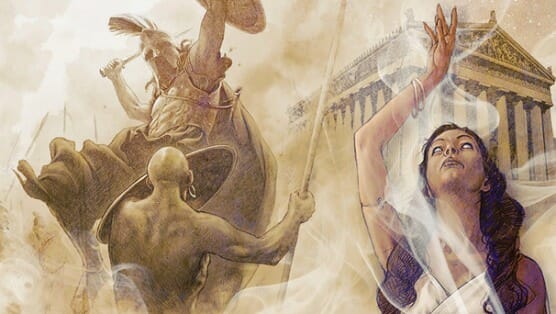Elysium Boardgame

Elysium is an ambitious new game that tries to meld several popular mechanics into a single, quick-playing game with a straightforward scoring system—building collections of similar cards for bonuses, with more points accruing to the player who creates each set first. With outstanding artwork for its ancient Greek mythological theme and clear iconography to indicate what cards bring what powers, it looks like another winner from Space Cowboys, the studio behind my top game of 2014, Splendor. But Elysium’s ambition doesn’t work well with its limited game length, producing gameplay that often feels frustratingly incomplete.
In Elysium, two to four players attempt to “write legends” in the form of sets of cards collected from the agora (central marketplace) in each of five epochs (rounds). These cards come in five families, each belonging to one of the better-known Greek deities; the game itself includes eight families, but in any particular match, players choose five of them and shuffle their sets into one master 105-card deck. Cards are numbered 1, 2 or 3, which affects their costs and their place in the collections called legends for final scoring. Each card also has some kind of power, which may be used immediately, once per turn, in combination with certain other cards, or at game-end for additional points.

During an epoch, each player will get to make four moves, taking three cards from the market and drawing one quest card that grants a specific combination of gold coins, victory points and transfers, the latter used to move cards from the player’s domain (where cards just drawn are placed) into his/her Elysium (where the collected legends are built for scoring). Each player has four columns, red, green, blue and yellow, which are used to collect the quest card and the cards from the agora, using a non-intuitive system: Each card or quest has one or two colored column icons on it; to take that card, a player must still have that colored column (or two columns), but can “pay” with a different column if so desired. That adds a decision-making element as players have to decide which columns to keep to maintain purchasing power for the remainder of the epoch, after which each player gets all four columns back for the next round. If a player lacks the correct columns to make a move, s/he must take a face-down card from the deck, treating it as a Citizen, a wild card that can be used to complete legends but carrying a two-point penalty at game-end.
-

-

-

-

-

-

-

-

-

-

-

-

-

-

-

-

-

-

-

-

-

-

-

-

-

-

-

-

-

-

-

-

-

-

-

-

-

-

-

-









































